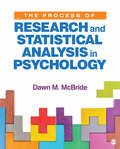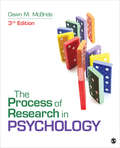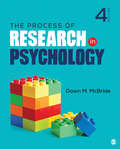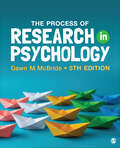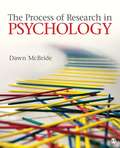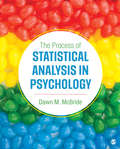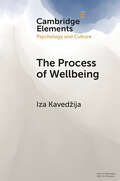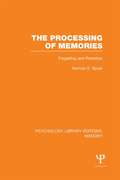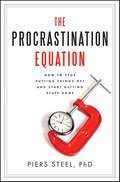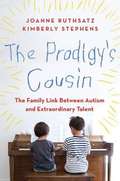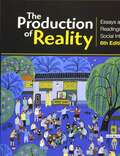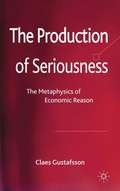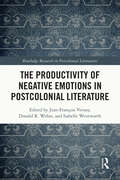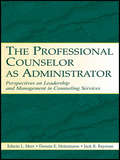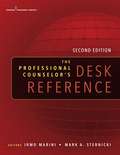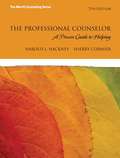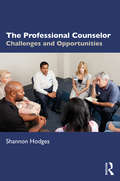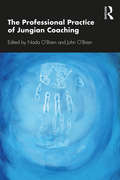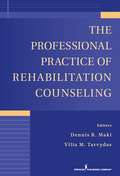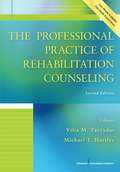- Table View
- List View
The Process of Research and Statistical Analysis in Psychology
by Dawn M. McBrideThe Process of Research and Statistical Analysis in Psychology presents integrated coverage of psychological research methods and statistical analysis to illustrate how these two crucial processes work together to uncover new information. Best-selling author Dawn M. McBride draws on over 20 years of experience using a practical step-by-step approach in her teaching to guide readers through the full process of designing, conducting, and presenting a research study. The text opens with introductory discussions of why psychologists conduct and analyze research before digging into the process of designing an experiment and performing statistical analyses. Each chapter concludes with exercises and activities that promote critical thinking, the smart consumption of research, and practical application. Readers will come away with a complete picture of the role that research plays in psychology as well as their everyday lives.
The Process of Research in Psychology
by Dawn M. McBrideUsing diverse examples from published research, the Third Edition of The Process of Research in Psychology by Dawn M. McBride provides step-by-step coverage on how to design, conduct, and present a research study. Early chapters introduce important concepts for developing research ideas while subsequent "nuts and bolts" chapters provide more detailed coverage of topics and examine the types of research relevant to the field. This logical two-part structure creates an excellent foundation upon which students can build their knowledge of the entire research process.
The Process of Research in Psychology
by Dawn M. McBrideThe Process of Research in Psychology employs the pedagogical approach of spaced repetition to present a student-friendly introduction to conducting research in psychology. Drawing on more than 17 years of teaching experience, best-selling author Dawn M. McBride covers topics with step-by-step explanations to help students understand the full process of designing, conducting, and presenting a research study. Early chapters introduce important concepts for developing research ideas, subject sampling, ethics, and data collection; more detailed coverage of these topics is included in “More About” chapters to provide instructors with flexibility in their teaching. Concepts and skills relevant to more than one stage of the research process are covered in multiple contexts, providing repeated exposure to the topics students often struggle with but that are the most important in gaining research skills.
The Process of Research in Psychology
by Dawn M. McBrideThe Process of Research in Psychology employs the pedagogical approach of spaced repetition to present a student-friendly introduction to conducting research in psychology. Drawing on more than 17 years of teaching experience, best-selling author Dawn M. McBride covers topics with step-by-step explanations to help students understand the full process of designing, conducting, and presenting a research study. Early chapters introduce important concepts for developing research ideas, subject sampling, ethics, and data collection; more detailed coverage of these topics is included in “More About” chapters to provide instructors with flexibility in their teaching. Concepts and skills relevant to more than one stage of the research process are covered in multiple contexts, providing repeated exposure to the topics students often struggle with but that are the most important in gaining research skills.
The Process of Research in Psychology
by Dawn M. McBrideWith a structure focused on process over memorization, best-selling author Dawn M. McBride′s The Process of Research in Psychology, Fifth Edition covers topics with a step-by-step approach to help students understand the full progression of developing, conducting, and presenting a research study from start to finish. Early chapters introduce important concepts for developing research ideas, subject sampling, ethics, and data collection; more detailed coverage of these topics is included in the "More About" chapters to provide instructors with flexibility to focus on the methods students will use in their projects. Concepts and skills relevant to more than one stage of the research process are covered in multiple contexts to give students repeated opportunities to learn about the most important, and often most difficult, research concepts at the moment they’re used. This new Fifth Edition features added discussion on validity and reliability; a reorganized chapter on survey research to group topics more clearly and to provide more information on qualitative analysis; more questions in the "Test Yourself" quizzes at the end of each chapter to focus more on application; and additional references to the increasingly popular statistical software programs JASP and R. This title is accompanied by a complete teaching and learning package. Contact your Sage representative to request a demo. Learning Platform / Courseware Sage Vantage is an intuitive learning platform that integrates quality Sage textbook content with assignable multimedia activities and auto-graded assessments to drive student engagement and ensure accountability. Unparalleled in its ease of use and built for dynamic teaching and learning, Vantage offers customizable LMS integration and best-in-class support. It’s a learning platform you, and your students, will actually love. Learn more. Assignable Video with Assessment Assignable video (available in Sage Vantage) is tied to learning objectives and curated exclusively for this text to bring concepts to life. Watch a sample video now. LMS Cartridge: Import this title’s instructor resources into your school’s learning management system (LMS) and save time. Don’t use an LMS? You can still access all of the same online resources for this title via the password-protected Instructor Resource Site. Learn more.
The Process of Research in Psychology
by Dawn M. McBrideWith a structure focused on process over memorization, best-selling author Dawn M. McBride′s The Process of Research in Psychology, Fifth Edition covers topics with a step-by-step approach to help students understand the full progression of developing, conducting, and presenting a research study from start to finish. Early chapters introduce important concepts for developing research ideas, subject sampling, ethics, and data collection; more detailed coverage of these topics is included in the "More About" chapters to provide instructors with flexibility to focus on the methods students will use in their projects. Concepts and skills relevant to more than one stage of the research process are covered in multiple contexts to give students repeated opportunities to learn about the most important, and often most difficult, research concepts at the moment they’re used. This new Fifth Edition features added discussion on validity and reliability; a reorganized chapter on survey research to group topics more clearly and to provide more information on qualitative analysis; more questions in the "Test Yourself" quizzes at the end of each chapter to focus more on application; and additional references to the increasingly popular statistical software programs JASP and R. This title is accompanied by a complete teaching and learning package. Contact your Sage representative to request a demo. Learning Platform / Courseware Sage Vantage is an intuitive learning platform that integrates quality Sage textbook content with assignable multimedia activities and auto-graded assessments to drive student engagement and ensure accountability. Unparalleled in its ease of use and built for dynamic teaching and learning, Vantage offers customizable LMS integration and best-in-class support. It’s a learning platform you, and your students, will actually love. Learn more. Assignable Video with Assessment Assignable video (available in Sage Vantage) is tied to learning objectives and curated exclusively for this text to bring concepts to life. Watch a sample video now. LMS Cartridge: Import this title’s instructor resources into your school’s learning management system (LMS) and save time. Don’t use an LMS? You can still access all of the same online resources for this title via the password-protected Instructor Resource Site. Learn more.
The Process of Research in Psychology
by Dawn M. McbrideUsing diverse examples from published research, the Third Edition of The Process of Research in Psychology by Dawn M. McBride provides step-by-step coverage on how to design, conduct, and present a research study. Early chapters introduce important concepts for developing research ideas while subsequent "nuts and bolts" chapters provide more detailed coverage of topics and examine the types of research relevant to the field. This logical two-part structure creates an excellent foundation upon which students can build their knowledge of the entire research process.
The Process of Research in Psychology (1st edition)
by Dawn M. McbrideThe book offers a clear description of concepts and skills important for conducting psychological research with clear, simple examples to illustrate these concepts. Author Dawn McBride covers the material in a methods text, but organizes as chronological steps in designing, conducting, and presenting a psychology research study. The concepts are presented using the special pedagogical approach throughout the text to present students with various learning opportunities in multiple contexts.
The Process of Statistical Analysis in Psychology: Mcbride: The Process Of Statistical Analysis In Psychology (paperback) + Mcbride: The Process Of Statistical Analysis In Psychology (paperback)
by Dawn M. McBrideThis new introductory statistics text from Dawn M. McBride, best-selling author of The Process of Research in Psychology, covers the background and process of statistical analysis, along with how to use essential tools for working with data from the field. Research studies are included throughout from both the perspective of a student conducting their own research study and of someone encountering research in their daily life. McBride helps readers gain the knowledge they need to become better consumers of research and statistics used in everyday decision-making and connects the process of research design with the tools employed in statistical analysis. Instructors and students alike will appreciate the extra opportunities for practice with the accompanying Lab Manual for Statistical Analysis, also written by McBride and her frequent collaborator, J. Cooper Cutting.
The Process of Statistical Analysis in Psychology: The Process of Statistical Analysis in Psychology
by Dawn M. McBrideThis new introductory statistics text from Dawn M. McBride, best-selling author of The Process of Research in Psychology, covers the background and process of statistical analysis, along with how to use essential tools for working with data from the field. Research studies are included throughout from both the perspective of a student conducting their own research study and of someone encountering research in their daily life. McBride helps readers gain the knowledge they need to become better consumers of research and statistics used in everyday decision-making and connects the process of research design with the tools employed in statistical analysis. Instructors and students alike will appreciate the extra opportunities for practice with the accompanying Lab Manual for Statistical Analysis, also written by McBride and her frequent collaborator, J. Cooper Cutting.
The Process of Wellbeing: Conviviality, Care, Creativity (Elements in Psychology and Culture)
by Iza KavedžijaThe Process of Wellbeing develops an anthropological perspective on wellbeing as an intersubjective process that can be approached through the prism of three complementary conceptual framings: conviviality; care; and creativity. Drawing on ethnographic discussions of these themes in a range of cultural contexts around the world, it shows how anthropological research can help to enlarge and refine understandings of wellbeing, through dialogue with different perspectives and understandings of what it means to live well with others and the skills required to do so. Rather than a state or achievement, wellbeing comes into view here as an ongoing process that involves human and nonhuman others. It does not pertain to the individual alone, but plays out within the relations of care that constitute people, moving and thriving in circulation through affective environments.
The Processing of Information and Structure
by W. R. GarnerFirst published in 1974. Routledge is an imprint of Taylor & Francis, an informa company.
The Processing of Memories: Forgetting and Retention (Psychology Library Editions: Memory)
by Norman E. SpearOriginally published in 1978, this volume contains the evidence that is most crucial for our understanding the processes of forgetting and retention. Organized in terms of problem areas and issues that are particularly pertinent to understanding these processes, the book deals with both animal and human studies. The author begins by defining the topic and reviewing its historical development. A theoretical orientation follows, and then the author begins to address the major factors that determine what is, and what is not, remembered. Although we cannot yet specify the principles from which we can predict when an episode, once learned, will be remembered well or forgotten entirely, the author demonstrates that such principles are not that far away. He considers the issues that must be resolved before such principles are established, and in the course of doing so covers the major research on why we remember events and why they are forgotten.
The Procrastination Equation: How to Stop Putting Things Off and Start Getting Stuff Done
by Piers Steel“The Procrastination Equation will teach you how to bust the excuses that are preventing you from doing your best work and living your best life….So don’t put it off any longer. Read this book. Today.” —Daniel H. Pink, author of Drive and A Whole New Mind“Illuminating….Piers Steel shows us the secrets of procrastination, how it affects us and how we will, one day, be able to prevail.”—Dan Ariely, author of The Upside of Irrationality and Predictably Irrational Using a mix of psychology, evolutionary biology, self-help, and more than a decade of research, Dr. Piers Steel, the world’s foremost authority on procrastination, offers a tried and true method helping us to identify, understand, and break free of our self-destructive bad habits and create more positive lives for ourselves.
The Prodigy's Cousin
by Joanne Ruthsatz Kimberly StephensWe all know the autistic genius stereotypes. The absentminded professor with untied shoelaces. The geeky Silicon Valley programmer who writes bulletproof code but can't get a date. But there is another set of (tiny) geniuses whom you would never add to those ranks--child prodigies. We mostly know them as the chatty and charming tykes who liven up daytime TV with violin solos and engaging banter. These kids aren't autistic, and there has never been any kind of scientific connection between autism and prodigy. Until now. Over the course of her career, psychologist Joanne Ruthsatz has quietly assembled the largest-ever research sample of these children. Their accomplishments are epic. One could reproduce radio tunes by ear on a toy guitar at two years old. Another was a thirteen-year-old cooking sensation. And what Ruthsatz's investigation revealed is nothing short of astonishing. Though the prodigies aren't autistic, many have autistic family members. Each prodigy has an extraordinary memory and a keen eye for detail--well-known but often-overlooked strengths associated with autism. Ruthsatz and her daughter and coauthor, Kimberly Stephens, now propose a startling possibility: What if the abilities of child prodigies stem from a genetic link with autism? And could prodigies-- children who have many of the strengths of autism but few of the challenges--be the key to a long-awaited autism breakthrough? In The Prodigy's Cousin, Ruthsatz and Stephens narrate the poignant stories of the children they have studied, including that of a two-year-old who loved to spell words like "algorithm" and "confederation," a six-year-old painter who churned out masterpieces faster than her parents could hang them, and a typically developing thirteen-year-old who smacked his head against a church floor and woke up a music prodigy. This inspiring tale of extraordinary children, indomitable parents, and a researcher's unorthodox hunch is essential reading for anyone interested in the brain and human potential. Ruthsatz and Stephens take us from the prodigies' homes to the depths of the autism archives to the cutting edge of genetics research, all while upending our understanding of what makes exceptional talent possible.From the Hardcover edition.
The Production of Reality: Essays and Readings on Social Interaction
by Jodi O 8242 BrienA one-of-a-kind social psychology book that inspires readers to be awake in the world. In this new, Sixth Edition, Jodi O’Brien continues to explore the historical development of the concept of the self, and help readers see the patterns we use to make sense of our own lives. The book introduces the major theories, concepts, and perspectives of contemporary social psychology in a uniquely engaging manner. Compelling original essays that provide an overarching framework are followed by a wide-ranging set of readings. By grounding social psychology in student experiences and explaining theories through stories and narratives, this one-of-a-kind book helps students understand the forces that shape their feelings, thoughts, and actions. Contributor to the SAGE Teaching Innovations & Professional Development Award Find out more at www.sagepub.com/sociologyaward
The Production of Seriousness
by Claes GustafssonThis book is about the roots of managerial rationality. A theoretical base, founded on the concept of 'memetics' is developed in order to explain human thinking and human reason as products of cultural evolution. Cultural change and development are explained by simple, value-driven memetic mechanisms like 'ritualization' and 'extremization'.
The Productivity of Negative Emotions in Postcolonial Literature (Routledge Research in Postcolonial Literatures)
by Donald R. Wehrs Isabelle WentworthThis volume explores the possibilities and potentialities of “negative” affect in postcolonial literature and literary theory, featuring work on postcolonial studies, First Nations studies, cognitive cultural studies, cognitive historicism, reader response theory, postcolonial feminist studies, and trauma studies. The chapters of this work investigate negative affect in all its types and dimensions: analyses of the structures of feeling created by socio-political forces; assemblages and alliances produced by negative emotion; enactive interrelationships of emotion and environment; and the ethical implications of emotional response, to name a few. It seeks to rebrand “negative” emotions as productive forces which can paradoxically confer pleasure, agential power, and social progress through literary representation.
The Professional Counselor as Administrator: Perspectives on Leadership and Management of Counseling Services Across Settings
by Edwin L. Herr Dennis E. Heitzmann Jack R. RaymanA largely undiscussed problem exists in the counseling community. Each year many excellent professional counselors with little or no administrative preparation or leadership experience are asked to assume administrative roles in schools, colleges and universities, state and federal government offices, community agencies, and foundations. The purpose of this book is to lighten their challenge by providing them with knowledge of the basic tasks and tools needed by a professional administrator and, equally important, how to adapt those tasks and tools to various professional settings. Key features of this outstanding new book include the following:*General Skills -- Chapters 1 and 2 address the meanings of the terms leadership, management and administration, examine the tasks associated with each term, and provide the concepts and skills (e.g., strategic planning, budgeting, recruitment and development of staff, use of technology, etc.) needed by any counseling administrator in any setting.*Applications -- Chapters 3-9 examine the similarities and differences in counseling leadership and management in different settings. The point is made that counseling services are rarely stand-alone structures; typically they are part of larger institutions to which they must demonstrate their contribution. No other book examines how counseling services are adapted to different settings.*Expertise -- Written by three professional counselors who collectively have more than 90 years of administrative experience, this book supplements existing research and scholarship with a wealth of personal experience -- especially on those topics where the published literature is thin.This book is appropriate for the following audiences: 1) graduate students in counselor education or counseling psychology who aspire to leadership positions; 2) practicing counselors entering (or those new to) administrative positions; 3) practicing counselors seeking to understand the institutional settings in which they practice; and 4) counseling administrators seeking an easy-to-use reference volume.
The Professional Counselor's Desk Reference (Second Edition)
by Irmo Marini Mark A. StebnickiWithout a doubt, many practitioners, students, supervisors, counselor educators, and researchers will treasure this unique handbook that contains a wealth of information on a variety of topical areas, some of which include professional identity, ethical and professional issues, case management and consultation, multicultural counseling issues, counseling theories and techniques, career counseling across the life span, assessment and diagnosis, counseling couples and families, disability-affirmative counseling, counseling diverse client populations, and contemporary issues in counseling.
The Professional Counselor: A Process Guide To Helping
by Sherry Cormier Harold L. HackneyStudents and beginning counselors can turn to this helpful guide to get the concepts, techniques, interventions, strategies, and skills they achieve effective results with their clients. Every step of the counseling process is covered, from initial client contact to relationship building, assessment, goal setting strategy selection, treatment planning, and finally evaluation and termination.
The Professional Counselor: Challenges and Opportunities
by Shannon HodgesThe Professional Counselor: Challenges and Opportunities weaves a rich narrative for the inner counselor of self-discovery, mindfulness and self-care, emotional intelligence, counselor identity, ethical issues, career maturation, and future trends in counseling. Readers will be confronted with professional decision points regarding enrollment in the counselor profession, ethical issues, client treatment, accreditation, and occupational outlook. The text also posits counseling as an emerging global profession and addresses the ways technology will transform professional practice. Each chapter concludes with a Lessons Learned section in which the author uses his personal and professional experiences to address relevant professional issues in mindfulness-based treatment. The Professional Counselor is an excellent resource and guide for students in graduate counseling programs, those considering the field, and counselors new to the profession.
The Professional Practice of Jungian Coaching: Corporate Analytical Psychology
by Nada O’BrienO’Brien and O’Brien and their collection of international contributors introduce the historical and current theory and practice of Corporate Analytical Psychology. Uniquely and practically bringing Jungian ideas to the corporate world, the chapters discuss the increasing need for ethical corporations in the context of individuation and moral hazard, demonstrate how to manage and define complexes that inhibit creativity and productivity, and shows practitioners how to recognise and connect with symbols as an active and living manifestation of the personal and collective psyche. The book is illustrated with practical examples and case studies encountered by the authors during their 30 years of experience consulting the world’s leading companies and institutions.
The Professional Practice of Rehabilitation Counseling (Second Edition)
by Dennis R. Maki Vilia M. TarvydasBased on the "Handbook of Rehabilitation Counseling" (Rigger/Maki 2004), this new volume has been completely revised and updated to accommodate the overarching changes that have recently occurred in the field. It reflects the new, accepted definition of rehabilitation counseling as a specialization "within" the field of counseling and demonstrates how the knowledge, skills and attitudes of rehabilitation counseling complement those of mental health counseling. The volume now includes an increased emphasis on education in general counseling, and mental health and substance abuse counseling; empirically supported practice; and a focus on the globalization of professional practice in rehabilitation counseling. It has been organized within a new conceptual framework for ease of use, and is based on the authors' ecological model that is a core framework for the book and the field itself. Key Features: Places rehabilitation counseling firmly within the profession of counseling Imparts the essence of the transformative rehabilitation practice Compatible with both CORE and CACREP standards for basic professional identity content Authored by nationally recognized experts in specialized topics who are acknowledge leaders in their field Designed for the practical use of students and instructors of introductory courses, as well as practicing professionals New to This Edition: Learning objectives for each chapter Content review and discussion questions for each chapter to enhance active learning PowerPoint presentations for instructors' use Model syllabus for an introduction to rehabilitation counseling course for instructors Exhaustive in scope, "The Professional Practice of Rehabilitation Counseling" will provide the expertise necessary for new graduates and practicing professionals who need to gain licensure and employment opportunities.
The Professional Practice of Rehabilitation Counseling (Second Edition)
by Vilia Tarvydas Michael T. HartleyRevised to reflect radical changes in the field and their impact on professional practice Now updated and substantially revised to reflect the CORE/CACREP merger and fundamental changes in the field, this comprehensive graduate-level second edition textbook articulates the complementary relationship between rehabilitation and mental health counseling and how it impacts professional practice. New information is introduced to address the increasing diversity of current and emerging job titles, duties, and settings, as well as to reframe existing content to better prepare rehabilitation counselors for navigating a continually shifting health care system. The second edition defines rehabilitation counseling as a specialty area of the broader counseling profession, and introduces psychiatric rehabilitation as a bridge to understanding the intersection of traditional rehabilitation and mental health counseling. It emphasizes recovery-based models and describes evidence-based research supporting the effectiveness of psychosocial interventions. Esteemed experts also address specific job functions related to assessment, credentialing, counseling, case management, advocacy, and career development. Four completely new chapters cover the fundamental concepts and models that underpin rehabilitation counseling, the evidence-based competencies that constitute rehabilitation counseling practice, and the specialized practices of forensic rehabilitation, and psychiatric rehabilitation. New and Key Features Reflects the CORE/CACREP merger and its impact upon rehabilitation counseling Conceptualizes rehabilitation counseling and its complementary relationship to counseling Includes new chapters on fundamental elements of rehabilitation counseling practice and on specialized practice in forensic and psychiatric rehabilitation. Addresses changes to CRCC 2016 Code of Ethics Covers the infusion of technology into distance education and counseling Laces a global perspective throughout with an emphasis on the ICF model Reflects the reality of professional practice in the current job market Includes new activities to enhance learning Offers an Instructors Manual with test item bank, Power Point presentations, and learning activities on applying chapter content Provides a model syllabus for Introduction to Rehabilitation Counseling
